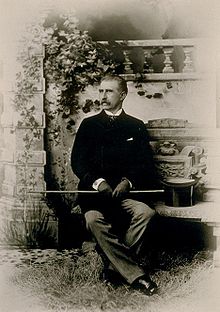John W. Mackay
| John William Mackay | |
|---|---|
 |
|
| Born |
November 28, 1831 Dublin, Ireland |
| Died | July 20, 1902 (aged 70) London, UK |
| Cause of death | Heart failure |
| Resting place | Green-Wood Cemetery |
| Occupation | Shipbuilder, prospector, partner in mines |
| Organization | Consolidated Virginia Mining Company Bank of Nevada |
| Known for | Being one of the "Bonanza Kings" |
| Net worth | USD $30 million at the time of his death (approximately 1/718 of US GNP) |
John William Mackay (November 28, 1831 – July 20, 1902) was an Irish-American industrialist. Mackay was one of the four Bonanza Kings, a partnership which capitalised on the wealth generated by the silver mines at the .
In 1851, he went to California and worked in placer gold-mines in Sierra County. In 1859, he went to Virginia City, Nevada, and there, after losing all he had made in California, he formed a business partnership with fellow Irishmen James Graham Fair, James C. Flood, and William S. O'Brien. The four dealt in mining stocks and operated silver mines on the , and in 1873 discovered the great ore body known as the "big bonanza" in the Consolidated Virginia and California mine. The four-way partnership was more commonly known as the Bonanza firm. Together they also established the Bank of Nevada of San Francisco.
In 1866, he married Marie Louise Hungerford, a native New Yorker. Snubbed by New York society, Louise moved to Paris where Mackay purchased a large mansion for her where his wealth enabled her to become a noted society hostess, entertaining royalty and throwing lavish parties for two decades.
In 1884, with James Gordon Bennett, Jr., Mackay formed the Commercial Cable Company — largely to fight Jay Gould and the Western Union Telegraph Company — laid two transatlantic cables, and forced the toll-rate for transatlantic messages down to twenty-five cents a word. In connection with the Commercial Cable Company, he formed in 1886 the Postal Telegraph Company as a domestic wire telegraph company so that Commercial would not need to rely on Western Union to collect and distribute telegraphic messages. Until Mackay and Bennett entered the field, all submarine cable traffic between the United States and Europe went over cables owned by the American financier Jay Gould. A rate war followed that took almost two years to conclude. Jay Gould finally quit trying to run John Mackay out of business. He was quoted as saying in reference to Mackay, "If he needs another million he will go into his silver mines and dig it out".
...
Wikipedia
